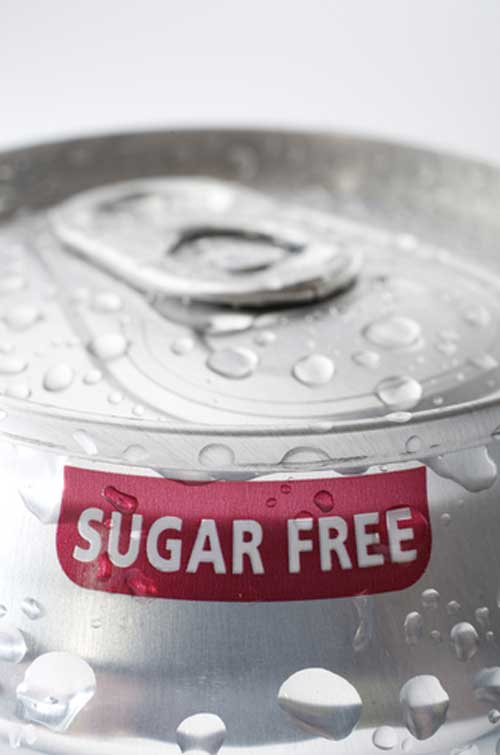It’s a growing trend. More people are reducing the amount of sugar in their diet – for good reason. Sugar has no nutritional value and is really just empty calories. Diets high in sugar are also linked with insulin resistance, a precursor to type 2 diabetes and heart disease.
There’s even evidence that sugar is addictive. When you eat a sugary item, your brain releases a brain chemical called dopamine that stimulates the reward center in your brain, making you feel good about your bad dietary choice. From a health standpoint, there’s no benefit to pumping more sugar into your system.
People trying to kick the sugar habit sometimes turn to sugar-free products to satisfy a raging sweet tooth – but is sugar-free any better? What does it mean when a product is sugar-free anyway?
Sugar-Free: What Does It Mean?
If you consult the FDA site, they’ll tell you a food or beverage labeled sugar-free has to have less than 0.5 grams of sugar in each serving and shouldn’t contain ingredients that are sugars or generally understood to be sugars. Sugars that fall under the umbrella definition of “sugar” include refined sugar, brown sugar, high-fructose corn syrup, and honey.
Sugar-free may sound like a good thing, but most sugar-free food and beverages have something added to them to make it taste sweeter. What’s added is one of two things: artificial sweeteners or sugar alcohols. Despite their popularity, some people still question the long-term safety of artificial sweeteners. Research in rats shows sucralose, the active ingredient in Splenda, changes gut bacteria.
A healthy balance of gut bacteria is important for gut and immune health and, possibly, for maintaining a healthy body weight. Sucralose may upset the delicate balance of friendly versus unfriendly intestinal bacteria. Plus, at least one study has linked sucralose with leukemia in rats.
Another concern about artificial sweeteners is their impact on hunger. Some research suggests artificial sweeteners “trick” your body by preparing it for calories that never arrive. As a result, foods sweetened with artificial sweeteners may not satisfy hunger.
What about Sugar Alcohols?
Sugar alcohols are found naturally in fruits and berries, so they’re a step up from artificial sweeteners. Some of the most common sugar alcohols in food and beverages are maltitol, sorbitol, erythritol, and xylitol. Sugar alcohols are not without their drawbacks though. For one, some sugar alcohols have a laxative effect and can cause diarrhea and bloating. Some people can tolerate sugar alcohols without problems – but if you consume enough of them and you’ll likely experience some degree of digestive unrest.
Unlike artificial sweeteners, sugar alcohols aren’t calorie free. They usually have between 30% to 50% of the calories in sugar. On the plus side, they won’t cause a spike in blood sugar like sugar can with the possible exception of maltitol syrup. In addition, they don’t cause tooth decay like sugar does. In fact, xylitol may protect against tooth decay. As a result, more dentists are recommending chewing gum that contains xylitol. Keep it away from your canine friends though. Xylitol is toxic to dogs.
Some sugar alcohols like sorbitol come from corn syrup, which means sorbitol may be genetically-modified. Other than digestive upset, sugar alcohols appear to be safe if you use them in moderation. At least at this point, there’s no research showing they’re unsafe.
No Sugar Added
You’ll also see the words “no sugar added” on the label of some foods and beverages. Some people think this is the same as sugar-free. Not so. You commonly see is on fruit juice labels where the fruit itself contains natural sugar. The company can’t use the term sugar-free due to the natural sugars in fruit. In fact, some fruits like bananas and pineapple are quite high in natural sugar.
Here’s the kicker. The INGREDIENTS used to make a product that has “no added sugar” can still contain sugar. For example, ice cream made with chunks of chocolate can be labeled as “no added sugar” because it has no sugar or sugar ingredients like honey or brown sugar added to the ice cream BUT the chocolate chunks still can have sugar. Tricky, huh? So, if you’re trying to avoid all sugar, no added sugar products aren’t necessarily the way to go.
The Problem with Sugar-Free and “No Sugar Added”
One issue with products that advertise themselves as sugar-free is they’re usually processed and contain other ingredients you don’t want in your diet like fillers, food colorings, and preservatives. Do yourself a favor and gradually wean yourself off of sweetened foods, whether the sweetener is artificial or natural. If you do it slowly, you won’t really miss their sweetness because your taste buds and brain will adapt. Over time, you’ll notice that “sweet” foods will taste too sweet and your cravings will decrease or become nonexistent. Plus, you’ll be healthier for it!
If you have a taste for something sweet, try a piece of whole fruit and enjoy the taste of natural sugar combined with phytonutrients, vitamins, and minerals. Isn’t that a better way to get your “sugar?”
Bottom line? You can kick the sugar habit without resorting to eating packaged foods marked sugar-free.
References:
Neuroscience & Biobehavioral Reviews. Volume 32, Issue 1, 2008, Pages 20-39.
Dis Model Mech. Nov 2011; 4(6): 842-849.
U.S. Food and Drug Administration. “Guidance for Industry and FDA: Dear Manufacturer Letter Regarding Sugar-Free Claims”
Federal Occupational Health. “No Added Sugar”
J Toxicol Environ Health A. 2008;71(21):1415-29. doi: 10.1080/15287390802328630.
Medical News Today. “Sucralose Causes Cancer Concern”
J Calif Dent Assoc. 2003 Mar;31(3):205-9.
American Diabetes Association. “Sugar Alcohols”
Related Articles By Cathe:
Are Artificial Sweeteners Safe or Not?
Do Artificial Sweeteners Cause Weight Gain?
The Pros and Cons of Various Natural Sweeteners
Beyond Sodium: is Sugar What’s Raising Your Blood Pressure?
New Evidence That Artificial Sweeteners Are Linked with Weight Gain


